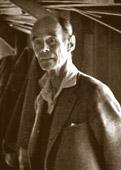Lord John Pentland

Lord John Pentland or Henry John Sinclair (1907-1984) was a pupil of P.D. Ouspensky and his wife Madame Ouspensky during the 1930s and 1940s, living in their houses in London and in Mendham, New Jersey. Madame Ouspensky maintained close contact with Gurdjieff. Lord Pentland regularly attended his lectures and participated in the farm work and movements. Raised in Madras India where his father was Governor General, he was the heir to the thousand year legacy of the St. Clair family and their vast estates in Scotland. Within which is the now famous Rosalyn Chapel said to be built by the Masons and the Knights Templar who had been given refuge by the St. Clair family. It seems that this family held a twin destiny, in supporting esoteric traditions while acting as Lords with responsibility for the welfare of many people. If he had desired he may have become prime minister of Scotland carrying on in the family tradition in government service or a very wealthy businessman. Instead, Lord Pentland gave up this legacy to take on the difficult and often unappreciated task of leading Mr. Gurdjieff’s Work in America. It gives teeth to the meaning of self-sacrifice.
After Mr. Ouspensky’s death he travelled in India and then went to Paris with his wife Lucy and their daughter, where he had an introduction from Madame Ouspensky to Gurdjieff. He stayed with Gurdjieff for nine months during that last year of the latter’s life in 1949. He described his experiences with Gurdjieff in Transmission: an interview with Lord Pentland in 1983. After Gurdjieff’s death Lord Pentland led Gurdjieff’s work in the United States and Canada.
He co-founded the Gurdjieff Foundation in New York in 1953, subsequently becoming its president with the support of his students, and remained in this position until his death in 1984. He played an important role in carrying out the publications of Gurdjieff’s and Ouspensky’s books in English. He also assisted in establishing Gurdjieff societies in numerous cities in the United States and Canada.
From 1969 to 1984 he was the executive editor of Far West Editions; during that time he supervised and frequently wrote anonymously for ten issues of Material for Thought, a magazine of anonymous reviews, essays, interviews and poetry, focused on “The inner search for one’s self.” He was the editorial adviser to many authors of the magazine and wrote reviews on some of their books published in Far West Editions. In 1974 he founded the Far West Institute and helped organized their biennial program, which from 1974 to 1984 presented six public lectures.
Lord Pentland was extraordinary, to say he was brilliant does not touch at the core of it; there was his Socrates-like ability to draw one into a search for meaning only to leave one standing alone facing the unknown, and his palpable development of higher bodies. He was like a living hieroglyph, linked to higher mind, a man of mystery who cared very much, so that life energy flowed from him with generosity.
Articles:





